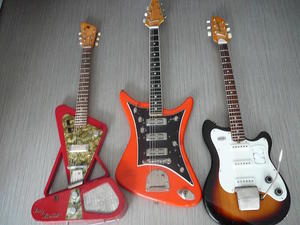- in Gear , Music , Music by Bobby Owsinski
When American Guitars Were Outlawed In England
 Considering the giant influence that British music had on America in the 1960s and 70s, it’s hard to believe that there was a time when American instruments were banned by the British government. This forced English musicians to use a wide range of other Euro-based guitars and somewhat explains why many of our guitar heros ended up using what they used.
Considering the giant influence that British music had on America in the 1960s and 70s, it’s hard to believe that there was a time when American instruments were banned by the British government. This forced English musicians to use a wide range of other Euro-based guitars and somewhat explains why many of our guitar heros ended up using what they used.
In an excellent article in Reverb, Tony Bacon tells the story about how the British government imposed a severe set of import restrictions on American goods (including vinyl records) in an effort to give a boost to the economy. These restrictions turned into a debacle and were rescinded in 1959, but not before it having a profound effect on British guitar slingers.
During the time period, the only way an English guitar player could get an American guitar was either on the used market, by doing a private import (which is how Hank Marvin ended up with his famous red Strat), or by buying one from a sailor (yes, really). In fact, that’s how George Harrison ended up with his first Gretsch. John Lennon bought his Rickenbacker while the band was playing in Germany, another way to get the guitar of choice.
Brit guitar players soon resorted to wide variety of continental brands, including Framus and Hofner from Germany, Hagstrom from Sweden, and Futurama (Jimmy Page’s first electric guitar – see the graphic on the left) from what was then called Czechoslovakia
When the ban was finally lifted, American guitars were soon available but were extremely expensive, going for more than twice the retail price of what could be found in the States. Prominent British music companies soon became the importers. Selmer distributed Gibson, Jennings (maker of Vox) distributed Fender, and Boosey & Hawkes imported Guild, Martin, and Harmony.
American instruments are still more expensive in England than in America, but Fender, Gibson, et all are relatively reasonable compared to what they were in the past. And with good reason. They’re still great instruments and hard to beat.

